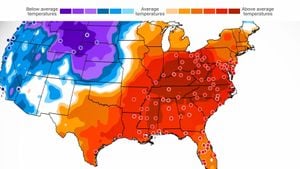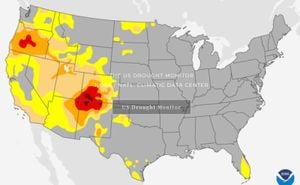After the results of the recent elections, African leaders have reacted warmly to Donald Trump's election victory, celebrating the return of what they term "transactional politics". This response, though positive from some quarters, is tinged with apprehension, especially surrounding the potential ramifications of Trump's protectionist policies on the continent and the global economy as a whole.
Few were quicker to offer their congratulations than leaders from powerful African nations. Morocco, which was the first nation to recognize the United States' independence, sent its best wishes to Trump, reflecting their long-standing diplomatic ties. Following suit were Egypt’s President Abdel Fattah el-Sisi and Ethiopia’s Prime Minister Abiy Ahmed, both of whom have personal stakes tied to U.S. engagement.
El-Sisi has previously had contentious relations with the Biden administration and welcomed Trump's return to power, viewing it as potentially beneficial for Egypt's standing. Ethiopia's Ahmed's prior relationships also suggest he anticipates continued support from Washington, particularly following his country’s exodus from turmoil and the recent endorsement from Trump’s former envoy to the region, J. Peter Pham, which had previously aligned with Ethiopia's maritime interests.
Further expressions of support for Trump also came from the leaders of Nigeria, including Bola Tinubu, and South Africa, Cyril Ramaphosa. Ramaphosa spoke about nurturing “mutually beneficial partnerships”, implying hopes for sustained or enhanced collaboration across areas of economic interest.
Yet, the optimism expressed by some African leaders is tempered by cautious voices from economists and analysts. Charlie Robertson has noted concerns about reverting to viewing Africa primarily through a post-Cold War lens, where nations are often characterized by their relations to powerful adversaries like Russia and China. He fears Trump’s presidency could shift U.S. focus away from cooperative models and toward geopolitically charged narratives.
For economist Raymond Parsons, the decisive mandate obtained by Trump signals increased instability for regions like Africa, where the reliance on multilateral trade becomes more pressing and precarious. Parsons highlighted nations like South Africa, which has significant export links to the U.S., and noted they may suffer due to heightened U.S. tariffs or protectionist measures aiming to prioritize American interests.
One organization, the African Export-Import Bank (Afreximbank), is already taking preemptive steps: they have hired lobbying firms to help secure the renewal of the African Growth and Opportunity Act (AGOA). This push reflects growing anxiety about the future of this important trade program, which has functioned as the cornerstone of U.S.-Africa trade relations for nearly 24 years.
Meanwhile, on the ground, voices from Nigeria are urging citizens to look inward and confront their challenges independently of U.S. leadership. Notably, former Nigerian House of Representatives member, Hon. Ehiozuwa Johnson Agbonayinma, emphasized the need for self-reliance. He argued against relying too heavily on foreign leaders like Trump, reminding Nigerians they must build their own institutions and resolve their internal issues. “Whatever affects America, affects Nigeria,” he underlined, showing awareness of the broader impacts of U.S. policy.
This viewpoint echoes sentiments from Magnus Onyibe, another Nigerian public policy analyst, who claimed Trump’s presidency may signify a shake-up of the global status quo. Onyibe asserted the American public clearly indicated they wanted Trump back, hoping it would bring about different methods of governance. They alluded to historical disappointments with previous U.S. administrations, which, he argued, did little for Africa.
A nuanced perspective surfaced amid discussions about minority representation. The euphoria some displayed following the election of Kemi Badenoch, the first Black leader of Britain’s Conservative Party, sparked debates within Africa about identity politics. Critics questioned the tendency to celebrate individual success within the Black community without delving deeply enough to hold such leaders accountable to their constituents. They cautioned against equipping leaders solely based on their background rather than evaluating their policies and governance structures.
This trend of cautious optimism extends to expectations of Trump's foreign policies. During his first term, Trump's administration prioritized investment rather than aid through initiatives like Prosper Africa, which aimed to stimulate U.S. investment across African nations. With his return, analysts are keeping a watchful eye on how these policies may shift. Experts argue there's potential for Trump to amplify economic partnerships focused on entrepreneurship rather than maintaining aid-centric relationships.
One aspect of previous U.S.-Africa relations under Trump was selective engagement with democratic issues, largely calibrated to align with U.S. interests. The Obama and Biden administrations prioritized democracy and grassroots engagement, whereas Trump's administration has been more transactional. This new transactional approach may appeal to African leaders who advocate for sovereignty and self-directed governance but raises questions about the long-term development of democracy on the continent.
Despite these shifts, the American diaspora remains significant. These communities contribute billions to African economies through remittances—dollars from abroad often prove to be more reliable than aid flows. Analysts suggest under Trump, there might be fewer barriers for diasporas to invest back home across Africa, fostering entrepreneurship and securing trade relationships not solely reliant on government-driven partnerships.
Although optimism abounds among African leaders hoping to leverage Trump’s presidency for economic gain, many obstacles and warnings persist. Historical dynamics, caution from various economists, and calls for self-reliance will shape the complex relationship between Africa and the U.S. as Trump re-assumes office.
Overall, as the dust settles from the election, African nations will need to strategize on how to navigate these changes intelligently. Balancing opportunities with historical perspectives will likely dictate the continent’s response to America’s renewed interest.



